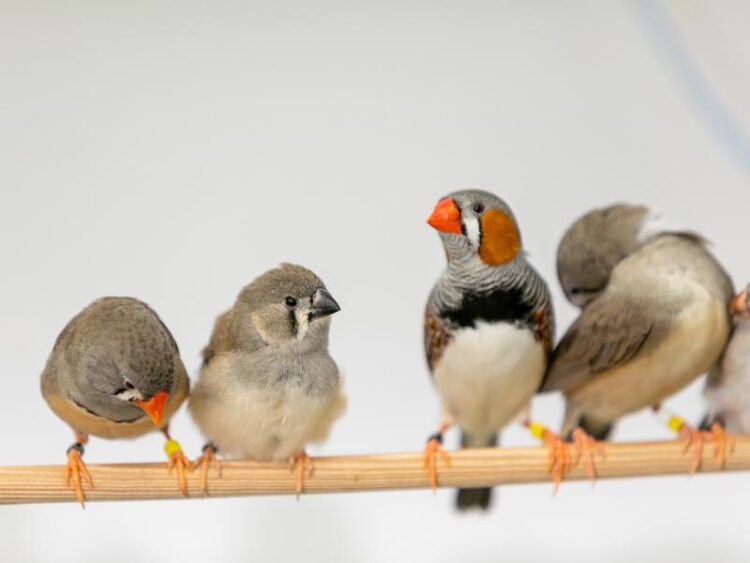Zebra finch chicks don’t babble for no reason

The babbling of zebra finches creates connections in the brain that enable them to memorize the song of their tutor. The picture shows a zebra finch chick (2nd from left) between a female (left) and a male (right).
© MPI for Biological Intelligence / Axel Griesch
When babies learn to talk or birds learn to sing, the same principle applies: listen and then imitate. This is how the first babble becomes the first word or vocalization. Male zebra finch chicks initially memorize the song of an adult bird. Later, they refine their own vocalization until they resemble the learned song. Researchers at the MPI for Biological Intelligence have now shown that the first vocalizations of zebra finches play a role even before they practice to sing on their own. The initial babbling is necessary to memorize songs in the first place. This is in line with findings in human infants, where the babbling of babies also plays a crucial role in language acquisition.
A male zebra finch chick hatches from its egg. Around 3-4 weeks later, it begins to make its first croaking sounds – these do not have much in common with its later song. But by the time it is three months old, the zebra finch has finished practicing its vocalizations: The song is now fully developed. And this is exactly what it will be singing for the rest of his life, to find a mate or to defend its territory.
Learning to sing in zebra finches is similar to learning to speak in humans: Chicks or babies imitate what they hear – for zebra finches it is usually the father`s song. The chicks go through two learning phases. Around 25 days after hatching, they begin to memorize the song of their tutor and store it as a template (sensory phase). The sensorimotor phase, which runs in parallel, begins a little later: In this phase, the chicks refine their own calls until they resemble the memorized template song.
It was previously assumed that the initial babblings initiate the sensorimotor phase, the time at which the chicks begin to imitate the memorized song. The mechanisms that trigger the previous, sensory phase of song learning remained unclear. Albertine Leitão and Manfred Gahr from the Max Planck Institute for Biological Intelligence have now shown that the babbling already initiates the first, sensory phase – thereby challenging the previous concept of song learning in zebra finches.
For their investigations, the researchers gave male zebra finch chicks the sex hormone testosterone. This caused the chicks to start babbling earlier than usual. Interestingly, the sensory phase also started earlier in these cases. To show that these two observations are linked, the researchers studied chicks that were temporarily unable to babble: They were unable to memorize their tutor`s song.
The researchers thus show that the role of babbling starts earlier than previously thought: The chicks have to babble in order to learn the song they intend to imitate. This probably creates connections in the brain that enable the zebra finches to memorize and store the song in the first place. This is consistent with findings in humans: The pre-linguistic babbling of babies plays a decisive role in their learning success during language acquisition.
Wissenschaftliche Ansprechpartner:
Dr. Albertine Leitão
Scientist
Max Planck Institute for Biological Intelligence
Email: albertine.leitao@bi.mpg.de
Prof. Dr. Manfred Gahr
Director
Max Planck Institute for Biological Intelligence
E-Mail: manfred.gahr@bi.mpg.de
Originalpublikation:
Babbling opens the sensory phase for imitative vocal learning
Albertine Leitão and Manfred Gahr
PNAS, online April 15, 2024
DOI: 10.1073/pnas.2312323121
Weitere Informationen:
https://www.bi.mpg.de/news/2024-04-gahr (Audio Samples of zebra finch vocalizations)
https://www.bi.mpg.de/gahr (Department website)
Media Contact
All latest news from the category: Life Sciences and Chemistry
Articles and reports from the Life Sciences and chemistry area deal with applied and basic research into modern biology, chemistry and human medicine.
Valuable information can be found on a range of life sciences fields including bacteriology, biochemistry, bionics, bioinformatics, biophysics, biotechnology, genetics, geobotany, human biology, marine biology, microbiology, molecular biology, cellular biology, zoology, bioinorganic chemistry, microchemistry and environmental chemistry.
Newest articles
Faster, more energy-efficient way to manufacture an industrially important chemical
Zirconium combined with silicon nitride enhances the conversion of propane — present in natural gas — needed to create in-demand plastic, polypropylene. Polypropylene is a common type of plastic found…

Energy planning in Ghana as a role model for the world
Improving the resilience of energy systems in the Global South. What criteria should we use to better plan for resilient energy systems? How do socio-economic, technical and climate change related…

Artificial blood vessels could improve heart bypass outcomes
Artificial blood vessels could improve heart bypass outcomes. 3D-printed blood vessels, which closely mimic the properties of human veins, could transform the treatment of cardiovascular diseases. Strong, flexible, gel-like tubes…




















